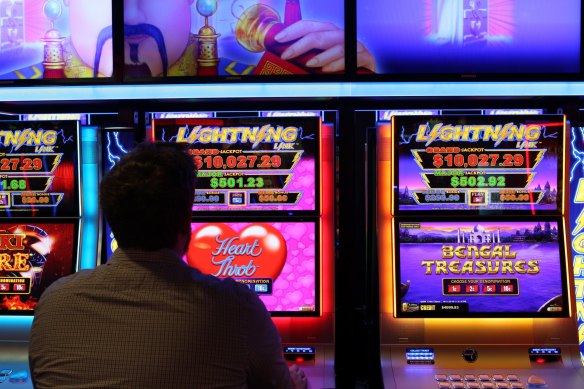Aristocrat Leisure is the big name behind the headlines when talk turns to Australia’s addiction to poker machines.
“Aristocrat, with its 50 per cent market share, is the gorilla behind the scenes, and the clubs and pubs are the ones out in front,” shareholder activist Stephen Mayne told Aristocrat investors in February as part of his failed pitch to join its board.

Aristocrat’s pokies business continues to be a jackpot for investors.Credit: Peter Braig
But the pokies manufacturer has been spending a large part of its gambling jackpot building up a business in the digital world far removed from the stench of the pubs, clubs and casinos.
This started in 2006 with the acquisition of Scandinavian start-up EssNet Interactive to exploit the growing global market for server-based video lottery product offerings.
“This is a key opportunity for us to enter a segment of the global gaming market in which we do not currently compete,” Aristocrat’s chief executive at the time, Paul Oneile, said.
With a market valuation of more than $25 billion and the shares testing record highs over the past 12 months, has the group’s big bet paid off?
Industry: Gambling
Main products: Poker machines (electronic gaming machines) and gambling applications for mobile phones and casinos.
Key figures: Len Ainsworth still casts a shadow, but the main players nowadays are veteran chief executive Trevor Croker, who has notched up eight years in the top job, and chairman Neil Chatfield.
How it started: Company founder Len Ainsworth made his name as a legend of the pokies industry at Aristocrat. This business has remained a jackpot for investors for many decades, driven by its addictive “high impact” machines that dominate NSW and Victorian pubs and clubs with potentially huge, but volatile, jackpots.
How it’s going: Over the past 17 years, Aristocrat has slowly armed itself with a new array of products targeting the mobile gaming market and now online gambling.
In 2021, it bundled a string of these acquisitions under one roof as a mobile game division with $1.8 billion in revenue and called it Pixel United.
More recently, there is the proposed acquisition of Neogames for $US1.8 billion ($2.8 billion) in equity and debt to buy its way into the online lottery market which provides solutions and services to national and state-regulated lotteries.
The larger play for Aristocrat is the so-called RMG (real money gaming market) that offers a complete range of gambling services to digital casinos, lotteries and sports betting sites across the rapidly developing US gambling market.
But the group’s recent financial result demonstrates the value, and resilience, of its traditional market of pokies – punters sitting in front of one of its machines with a beer in hand.
While Pixel wilted in the post-COVID lockdown world, pokies continued to boom for the half-year ending March 31 this year, powering a 12 per cent rise in revenue to just over $3 billion while net profit soared 17 per cent to $619 million.
Pixel reported a 7 per cent decline in revenue and 16 per cent decline in net profit. It was hit by a number of factors including a post-COVID challenge as the ending of lockdowns gave customers a lot more options for their leisure time.
Luckily for Aristocrat, this included punters returning to reopened casinos, which have prospered accordingly.
As Croker puts it, it is the benefit of a diversified business with a “land-based gaming” [pokies] business, mobile gaming, or its new venture with the proposed acquisition of Neogames.
“We believe this will truly be transformational for Aristocrat,” Croker says.
The bull case: Macquarie is bullish with a $46.50 price target for a stock trading around $38.40 on its strength in the pokies market – including rising profit margins as supply chain pressures ease – and the potential growth options with Neogames.
“Importantly, we continue to have high conviction with earnings upside, in particular with Anaxi paring losses in the second half of the 2023 financial year,” Macquarie says.
Morgan Stanley also remains bullish with a $43 price target despite the underperformance of Aristocrat’s digital business.
The bear case: All the growth options that Neogames might provide won’t be worth anything if it can’t land the deal, and meanwhile no one sees any silver lining to the woes at Pixel, which currently accounts for one-third of the group’s profit.
Morningstar Equity Research, another Aristocrat fan – based on its pokies business – is dour about the immediate prospects for Pixel.
“Competition for attention is up, and we do not think Aristocrat has carved a competitive advantage in the mobile gaming space, which is highly competitive,” Morningstar’s Angus Hewitt says.
“We expect growth will prove harder to come by moving forward and forecast segment growth, [and] operating earnings growth slowing to around 2 per cent per year to fiscal 2027.”